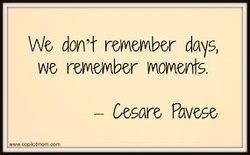 Publishmed.com
Publishmed.com The reason our memories are so malleable, Kimberley Wade explains, is because there is simply too much information to take in. "Our perceptual systems aren't built to notice absolutely everything in our environment. We take in information through all our senses but there are gaps."
When we remember an event, our memory fills in the gaps by using what it knows.

Usually, false memories are about everyday situations with no real consequences apart from an occasional disagreement with a friend or partner about trivial things like who said what. For instance, my husband will say he thought of doing something, when I clearly remember making the suggestion.
But sometimes, false memories can have more serious ramifications. For example, if an eyewitness testimony in court contributes to a false conviction. Forensic technology has now led to many such convictions being overturned. The Innocence Project in the US campaigns to overturn eyewitness misidentification and lists all the people who have subsequently been acquitted. The project reports that there have been 311 post-conviction DNA exonerations in the US, which includes 18 people who were sentenced to death before DNA evidence was able to prove their innocence.
Christopher French of Goldsmiths University in London says there is still a lack of awareness of how unreliable human memory is, especially in the legal system.
Some people still believe memory works like a video camera. Others accept the Freudian notion of repression - that when something terrible happens, the memory is stored in the subconscious.

Sergio Della Sala, a cognitive neuroscientist at the University of Edinburgh, UK, says it can be thought of in the following way. Imagine you are in the jungle and you see some grass moving. Humans are likely to panic and run away, with the belief that there could be a tiger lurking.
A computer, however, might deduce that 99% of the time, it is simply the wind. If we behaved like the computer, we would be eaten the one time a tiger was present. The brain is prepared to make 99 errors to save us from the tiger. That's because the brain is not a computer. It works with irrational assumptions, is prone to errors, and it needs shortcuts.
However, he assures us that false memories are the sign of a healthy brain. They are a by-product of a memory system that works well. In other words, think fast and use your judgment.

 RSS Feed
RSS Feed






